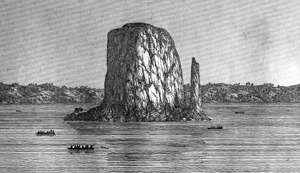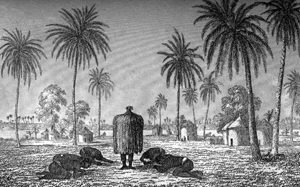“The Fetísh at Patashie”
While we stood near the water’s edge, hundreds of people were collected there to look at us, and among them was a native Pagan priest, who was dressed more fantastically than any Merry-Andrew in Christendom. His clothing was manufactured almost solely of fine soft grass. His head and shoulders and part of his body were hid underneath an enormous thing, in shape like the roof of a hut, with a fringe and tassels of stained grass. A tobe, made also of grass, excellently woven and of various colours, encircled his body, and reached as far as the knee; and the man wore likewise trowsers of the same material, and plaited in a similar manner, but this was unstained, and of the colour of dried grass; it was turned up at the ankles, though a deep fringe hung to the ground. He approached several individuals that were sitting on the turf, and stooping over them, the priest enveloped the upper part of their persons in his uncouth head-dress; shook it over them, which produced a strange rustling noise; screamed in a most frightful and unearthly tone; and then arose to perform the same barbarous ceremony to others. [Vol. 2, pp. 238-39]
“The Nouffie Canoe”
We have seen to-day several large canoes, the bottom of which is made of a single tree and built up with planks to a considerable height. In many of them sheds, or houses as they are called, have been erected, which are thatched with straw, and in which fires are kindled, food prepared, and people sleep, and indeed live altogether. The roof is circular, and formed in much the same manner as the upper part of a covered wagon in England. These sheds are of the most essential service to the natives, as, with their assistance, merchants are enabled to travel with some degree of comfort, with their wives and household, several days’ journey up and down the Niger, without being under the necessity of landing, except to purchase provisions, or whenever they feel inclined to do so. As the people have nothing that equals or answers to pitch, hemp, or tar, they use iron staples for the purpose of repairing it and keeping the planks together when a canoe becomes leaky, or any part of it, as it frequently happens, is split by exposure to the rays of the sun. We have seen an old canoe, which had undergone repairs several times, with no less than from eight to ten thousand of these staples driven into her sides and bottom. [Vol. 2, pp. 261-62]

“Mount Kesa”
Near the island of Madjie, the Niger branches into three streams, and we were recommended to follow the most easterly, because the other two were neither considered so deep nor so free from danger. On leaving the island we journeyed very rapidly down the current for a few minutes, when, having passed another, we came suddenly in sight of an elevated rock, which is called Mount Kesa by the natives, and almost at the same instant we found ourselves abreast of it. It forms a small island, and is probably not less than three hundred feet in height, which renders it a conspicuous and remarkable object. . . . It is greatly venerated by the natives of this part of the country, and, as may readily be imagined, favours the superstitious notions which are attached to it by a simple and credulous people, who, like the vulgar of Europe, are fond of the marvellous. [Vol. 2, pp. 269-70]

“Banks of the Quorra”
At one A.M., the direction of the river changed to south-south-west, running between immensely high hills. At five o’clock this morning, we found ourselves nearly opposite a very considerable river, entering the Niger from the eastward; it appeared to be three or four miles wide at its mouth, and on the bank we saw a large town, one part of which faced the river, and the other the Quorra. We at first supposed it to be an arm of that river, and running from us; and therefore directed our course for it. We proceeded up it a short distance, but finding the current against us, and that it increased as we got within its entrance, and our people being tired, we were compelled to give up the attempt, and were easily swept back into the Niger. Consequently we passed on, but determined on making inquiries concerning it the first convenient opportunity. But we conclude this to be the Tshadda, and the large town we alluded to, to be Cuttumcurrafee, the same which had been mentioned to us by the old Mallam. At all events, we had satisfied ourselves it was not a branch of the Niger. The banks on both sides, as far as we could see up it, were very high, and appeared verdant and fertile. [Vol. 3, pp. 69-70]

“The Eboe Canoe”
The Brass canoe [King Boy’s canoe], which is now become our dwelling, is extremely large and heavily laden. It is paddled by forty men and boys, in addition to whom there may be about twenty individuals, or more, including a few slaves and ourselves, — so that the number of human beings will amount to at least sixty. Like Obie’s war canoes, it is furnished with a cannon, which is lashed to the bow, a vast number of cutlasses, and a quantity of grape and other shot, besides powder, flints, &c. It contains a number of large boxes or chests, which are filled with spirituous liquors, cotton, and silk goods, earthenware, and other articles of European and other foreign manufactures; besides abundance of provisions for present consumption, and two thousand yams for the master of a Spanish slaver, which is now lying in Brass river. In this canoe three men might sit with ease abreast of each other, and from the number of people which it contains, and the immense quantity of articles of various descriptions, some idea of its size may be formed. It has been cut out of a solid trunk of a tree, and draws four feet and a half of water, being more than fifty feet in length. But it is so deeply laden that not above two inches of the canoe is to be seen above the water’s edge. With its present burden, it would be impossible for her to sail on any river less smooth than the Niger, and even as it is, when it comes to be paddled, there will be danger of its being swamped. It is really laughable to reflect that the canoe is supplied with two immense speaking-trumpets, which, considering the Stentorian lungs of the men of Brass, are entirely superfluous. . . . We shall sleep in the canoe to-night, but it is almost unnecessary to say that want of room, as in former cases, will be an intolerable grievance. [Vol. 3, pp.209-10]

